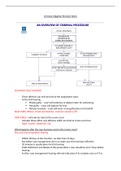Criminal Litigation Revision Notes
SUMMARY ONLY MATTERS
- These offences can only be tried at the magistrates court.
- At the first hearing.
Pleads guilty – court will sentence or adjourn later for sentencing
Not guilty – court will adjourn for trial
Refuses to plead – court will enter a not guilty plea on his behalf.
Road traffic offence, drunk and disorder, common assault (s.39)
INDICTABLE = will only be tried at the crown court
- Includes those either way offences which are tried at crown court too.
- Rape, murder, blackmail, riot.
What happens after the case has been sent to the crown court?
Plea and trial preparation hearing
- Within 28 days of the transfers, no later than 35 days.
- Key better case management aim is to make sure this hearing is effective
- 20 minutes is usually given for this hearing
- Draft indictment and details of the prosecution’s case should be sent 7 days before
hearing.
- Further case management hearing will only take place if its complex case or if it is
, required in the interest of justice.
Not guilty plea = judge will make enquires and set aside realistic and bespoke directions,
explore issues on uncontested evidence so it can be agreed. Also considers witness
requirements.
Guilty plea = judge will sentence without unnecessary adjournments.
Better case management overreaching principles
- Getting it right the first time
- Case ownership
- Duty of direct engagement
- Consistent judicial case management.
EITHER WAY OFFENCE = Can be tried at the magistrates courts or the crown court. Where
the case should be heard is decided in the first hearing.
(Theft, ABH, violent disorder and affray)
The initial hearing is divided into two parts
1. Plea before venue =
- s. 17A of Magistrates Court Act 1980, allows D to indicate to the court if he wishes to
plead guilty or not guilty.
- This must be made personally (R v Ellis)
PLEAD GUILTY = magistrates proceeds to sentencing or adjourn for sentencing later. They
must see if they have the adequate sentencing powers or consider if they need the remit to
crown court.
PLEADS NOT GUILTY = magistrates will proceed to allocation.
NO INDICATION OF A PLEA = magistrates will proceed to allocation.
Allocation; if it will stay at magistrates or go to crown court
Stage 1 = magistrates will decide if they accept jurisdiction. They will have to look at their
own sentencing powers, defendants previous convictions, sentencing code from the
sentencing act 2020.
- If magistrates refuse jurisdiction, the case will be sent to the crown court. If they
accept stage 2 will take place.
Stage 2 = D can consider where he wants the trial to take place.
,SPEACIAL RULES FOR CLASSIFICATION OF OFFENCES FOR CRIMINAL DAMAGE AND THEFT:
CD = either way offence but if the damage is less than £5000, it will be summary.
THEFT = it is either way offence, but low level shoplifting will be treated at summary if the
value of the items taken does not exceed £200.
Legal burden of proof
, - The prosecution will in most cases bear the legal burden of proving the defendant
guilt.
- Prove their case beyond reasonable doubt (sure).
- Defence do not need to prove anything.
If the defendant has a specific defence like an alibi or self-defence, the CPS will still hold the
legal burden. Must prove this beyond all reasonable doubt.
Insanity;
- The legal burden falls onto the defendant if they plead not guilty and use the
defence of insanity.
- On the balance of probabilities.
Evidential burden
- CPS must have sufficient evidence to justify the finding of guilt.
- If they fail to do so, the defendant solicitor may be entitled to make a submission of
no case to answer.
If defendant has relies on a specific defence (alibi, self-defence), they will have to place
some evidence of that defence to the court. The onus on the CPS as part of its legal burden
to prove that beyond reasonable doubt that the defence is not true.
TYPES OF EVIDENCE
DOCUMENTARY = business document, letters, written statement from witness etc.
REAL EVIDENCE = drugs, weapons, CCTV footage.
ORAL EVIDENCE = witnesses give when in court (facts) or expert evidence.
Sentencing
(Most serious to least serious)
- Custody = prison, the custodial threshold (152(2) CJA) must have been crossed. Only
immediate custody will suffice, as deemed by the courts.
- Suspended custody = The custody is suspended for a period of time. If the defendant
re offends within this time, he will have to serve the sentence. The court has once
again decided that the custody threshold has been passed. (s.152 CJA).
- Generic community order = court must have decided that this offence has passed
the community threshold. Offence was so serious, that only a CO would suffice.
(s148(1) CJA 2003)
The order can come with several attachments, such as unpaid work, curfews, anger
management course.
- Fine
- Conditional discharge = very minor offence takes place, e.g. drunk and disorderly. No
immediate penalty but the discharge is issued for a period of time, could be a max of




